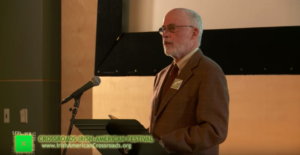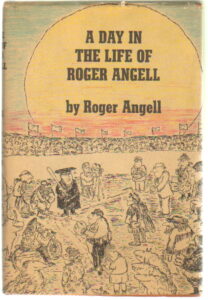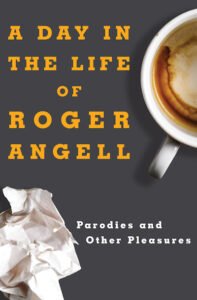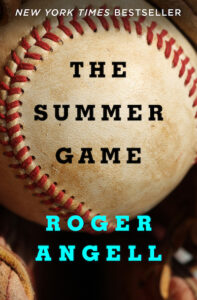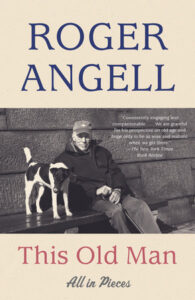Peter Quinn: Banished Children of Eve: A Novel of Civil War New York
December 10, 2021 by David
Filed under Fiction, WritersCast
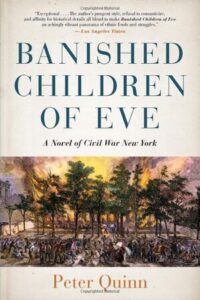 Banished Children of Eve: A Novel of Civil War New York – Peter Quinn – Empire State Editions (Fordham University Press) – 978-08232-9408-4 – 612 pages – paperback – $17.95 (eBook version is not available for this title)
Banished Children of Eve: A Novel of Civil War New York – Peter Quinn – Empire State Editions (Fordham University Press) – 978-08232-9408-4 – 612 pages – paperback – $17.95 (eBook version is not available for this title)
Historical novels based in New York City have always appealed to me. I am not sure why. Maybe it has something to do with the time I spent with my grandparents, who lived in New York City, took me frequently to the Museum of the City of New York, and showed me many of the historical sites of the city. Maybe it is simply because so much of American history is the history of that great city.
I picked this book to read while browsing a bookstore for the first time since the pandemic began. Book discovery is a wonderful thing, and something many of us have missed. There are occasions when a book seems to jump off the shelf and into your hands, drawn there by some mysterious bookstore magic. Sometimes those discoveries are serendipitous and that was definitely the case with this novel. It was not the only book I bought that day, but it jumped my queue and I devoured the book in a way that reminded me of my youthful nights under the covers reading by flashlight.
Banished Children of Eve is one of those longish historical novels that is a joy to immerse oneself in. It is a great story about a dramatic time and place, with terrific well-drawn characters and a great story unfolding in multiple voices. And even the minor characters are brought to life by Quinn’s sympathetic descriptions.
The story takes place in 1863 when the Civil War is its third bloody year and the Union, having exhausted its volunteer army, has been forced to impose the first military draft. In New York City, where this book is set, that is a fateful decision, one that will set off the worst urban riot in American history. The cast of characters created by author Quinn represents every element of New York’s cultural community including an Irish-American hustler, a dishonest Yankee stockbroker, a young immigrant serving girl, a beautiful mixed-race actress and her white lover (a struggling minstrel). Surrounding these main characters are a number of historical, real-life characters we recognize, including the Union General George McClellan, Archbishop “Dagger John” Hughes and even the songwriter Stephen Foster.
All come together in the emerging disaster of the Draft Riots, bringing to life a period in American history that is certainly less well-known to most Americans than the more often told stories of battles and national politics of our war-torn country.
William Kennedy’s description of Peter Quinn pretty much sums up how I feel about this book: “Peter Quinn takes history by the throat and makes it confess.” That is perhaps one of the greatest book blurbs ever, by the way.
Quinn is a natural storyteller, and if you are not familiar with this incredible period in American history, I recommend you get a copy of this book immediately and dive in. You will be amazed and thrilled to read this book.
Talking to Peter was great fun for me. We certainly could have gone on for hours. I hope you enjoy our conversation as much as I did.
Quinn was the chief speechwriter for Time, Inc. and retired as corporate editorial director for Time Warner at the end of 2007. He received a B.A. from Manhattan College, an M.A. in history from Fordham University and completed all the requirements for a doctorate except the dissertation. He was awarded a Ph.D., honoris causa, by Manhattan College in 2002.
In 1979, Quinn was appointed to the staff of Governor Hugh Carey as chief speechwriter. He continued in that role under Governor Mario Cuomo.
Originally published in 1994, Banished Children of Eve won a 1995 American Book Award. Hour of the Cat, set in Berlin and New York on the eve of WWII, was published in 2005, a nonfiction collection, Looking for Jimmy: In Search of Irish America was published in February 2007. His third novel, The Man Who Never Returned is based on the still-unsolved 1930 disappearance of NYS Supreme Court Justice Joseph Force Crater, published in 2010.
Quinn co-wrote the script for the 1987 television documentary McSorley’s New York, for which he won an Emmy. He appeared in several PBS documentaries, including The Irish in America, New York: A Documentary Film, and The Life and Times of Stephen Foster, as well as the dramatic film, The Passion of Sister Rose. Quinn was an advisor on Martin Scorcese’s film Gangs of New York, the story of which precedes and in some ways underpins Banished Children of Eve.
Quinn was the editor of The Recorder: The Journal of the American Irish Historical Society from 1986 to 1993 and has published articles and reviews in the New York Times, Commonweal, America, American Heritage, the Catholic Historical Review, the Philadelphia Enquirer, the L.A. Times, Eiré-Ireland, and other newspapers and journals.
Quinn is also president and co-founder of Irish American Writers & Artists.
You can buy Banished Children of Eve at Bookshop.org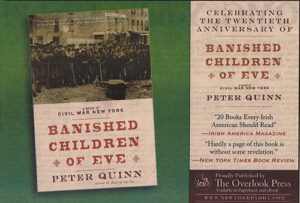
Podcast: Play in new window | Download
Writerscast: David Wilk interviews Roger Angell
October 1, 2020 by David
Filed under Non-Fiction, WritersCast
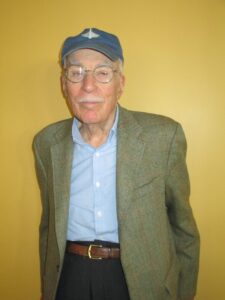 A couple years ago, in the process of researching the mostly unknown and under-appreciated New Yorker writer Robert M. Coates, I reached out to Roger Angell, who knew Coates during his many years of writing for and working at The New Yorker (and whose mother, Katharine Sergeant Angell White, and stepfather, E.B. White, knew Coates well from the earliest days of the magazine in New York and elsewhere). I wanted to learn as much as I could about Coates, and in the process, had the distinct pleasure of talking to one of the greatest writers of our time.
A couple years ago, in the process of researching the mostly unknown and under-appreciated New Yorker writer Robert M. Coates, I reached out to Roger Angell, who knew Coates during his many years of writing for and working at The New Yorker (and whose mother, Katharine Sergeant Angell White, and stepfather, E.B. White, knew Coates well from the earliest days of the magazine in New York and elsewhere). I wanted to learn as much as I could about Coates, and in the process, had the distinct pleasure of talking to one of the greatest writers of our time.
After telling me some interesting first-hand remembrances of Coates, Roger was kind enough to sit or an in-person interview with me in his apartment in New York along with his wife Peggy Moorman. It’s my honor to publish this interview now to celebrate Roger Angell’s 100th birthday. His prodigious, meticulous, and far-ranging memory is a match for his remarkable abilities as a writer.
Roger has always lived in New York City, and spent summers in Brooklin, Maine. He graduated from Pomfret School and Harvard University, served in the Air Force in World War II, first as an instructor in machine guns and power turrets, and then, in the Pacific, as an editor and reporter for the GI magazine Brief.
In 2014 Roger was inducted into the writers’ section of the Baseball Hall of Fame, and then in 2015 he was deservedly elected to the American Academy of Arts and Letters.
It is impossible to speak about and with Roger Angell without mentioning his writing about baseball, for which he is best known, including the classic books, The Summer Game and Five Seasons: A Baseball Companion, as well as a number of great shorter pieces that appeared first in the The New Yorker.
Angell’s earliest published works of short fiction and personal narratives. Several of these pieces were collected in early books, The Stone Arbor and Other Stories (1960) and A Day in the Life of Roger Angell (1970).
Roger first contributed to the The New Yorker in March 1944. He began writing about baseball in 1962, when William Shawn, then the editor of The New Yorker sent him to Florida to write about spring training and over the course of several decades produced some of the best baseball books ever written, inspiring countless readers with his brilliant descriptions of baseball games and players, and of course, fans of the game.
In a review of Once More Around the Park for the Journal of Sport History, Richard C. Crepeau wrote that “Gone for Good”, Angell’s essay on the career of Steve Blass,”may be the best piece that anyone has ever written on baseball or any other sport”.
While Angell has been praised fulsomely for his baseball writing, I’d prefer to think of him as simply one of the better literary stylists of our time. Listening to Roger Angell talk about books, writers and his writing life was one of the great pleasures of my own literary life, which I am pleased to share with you here.
Roger turned 100 on September 19, 2020. Happy Birthday Roger! And thank you and Peggy, for giving me the opportunity to speak with one of my literary heroes.
“Angell writes about baseball the way M.F.K. Fisher did about food, as a metaphor for life’s complexities of desire, defeat, utility and beauty.” — Phillip Lopate
This article in The New Yorker by David Remnick – “Roger Angell Turns 100” – is a must-read piece.
7 Must-Read Roger Angell Books: Legendary essays on baseball, reflections on aging, and so much more. Stephen Lovely, The Archive. 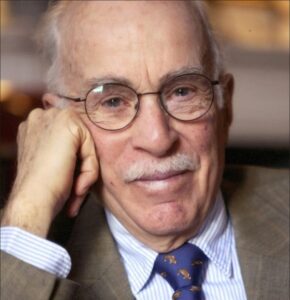
List of Roger Angell’s Books
A Day in the Life of Roger Angell
Five Seasons: A Baseball Companion
Game Time
Late Innings
Let Me Finish
This Old Man: All in Pieces
Once More Around the Park: A Baseball Reader
A Pitcher’s Story: Innings with David Cone
Season Ticket
Selected Shorts: Baseball, a Celebration of the Short Story
The Summer Game
Roger Angell Day – Celebrating Roger Angell – a 100th birthday celebration was held at the Friend Memorial Public Library in Brooklin, Maine, August 8, 2020 Photo by Bill Ray
Podcast: Play in new window | Download
Kevin Baker: The Fall of a Great American City: New York and the Urban Crisis of Affluence
January 28, 2020 by David
Filed under Non-Fiction, WritersCast
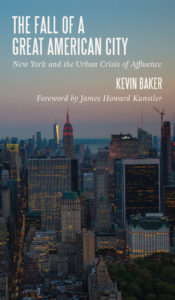 The Fall of a Great American City: New York and the Urban Crisis of Affluence – Kevin Baker (foreword by James Howard Kunstler) – 9781947951143 – City Point Press/Harper’s Magazine – Hardcover – 176 pages – October 8, 2019 – eBook editions available at lower prices.
The Fall of a Great American City: New York and the Urban Crisis of Affluence – Kevin Baker (foreword by James Howard Kunstler) – 9781947951143 – City Point Press/Harper’s Magazine – Hardcover – 176 pages – October 8, 2019 – eBook editions available at lower prices.
Kevin Baker has been one of my favorite writers for many years. He authored a wonderful baseball novel, Sometimes You See It Coming, based loosely on the life of Ty Cobb, but set in the modern day. I have read that book at least twice. Later, I was fortunate to work with Kevin on a project for the History Channel, and I have long appreciated his nonfiction history writing as well. When I read his essay in the July, 2018 issue of Harper’s Magazine, where Kevin often publishes on current affairs, called The Death of a Once Great City, I felt strongly that this story needed to be read as widely as possible. Kevin’s perceptive observations about New York City and its modern real estate-based problems, resonated with my own experience of the direction that modern American culture is moving. His piece seemed to me important enough to be made into a book.
Harper’s John MacArthur and Lynn Carlson agreed with my thinking, and together with Kevin, we worked out an arrangement for publication of an expanded and enhanced version of Kevin’s original essay to be published in book form by my imprint, City Point Press. I am very pleased to have been able to work with Kevin and Harper’s on what is now called The Fall of a Great American City: New York and the Urban Crisis of Affluence.
This is the story of what is happening today in New York City and in many other cities across America. It is about how the crisis of affluence is now driving out everything we love most about cities: small shops, decent restaurants, public space, street life, affordable apartments, responsive government, beauty, idiosyncrasy, each other. This is the story of how we came to lose so much—how the places we love most were turned over to land bankers, billionaires, the worst people in the world, and criminal landlords—and how we can – and must – begin to take them back.
I think this is an important story and hope my listeners will agree. I do not usually talk to writers about books I have published myself for Writerscast, as I do not want this podcast to be about the books I publish rather than the books I read. But in this case, since I came to this book through the original essay that I did read, I think it is meaningful to present my conversation with Kevin for your listening enjoyment.
Kevin is a terrific writer, and this book presents a strong case for rethinking our approach to modern urban life. New York, San Francisco, Los Angeles, Chicago, Boston, and many other cities are all suffering through the same sorts of real estate crises. I was not alone in being moved by Kevin’s piece in Harper’s – the magazine has reported that the original essay was one of the most read of all pieces it has ever published and has “gone viral” online to reach a vast audience.
This story affects us all and challenges us to rethink how we approach the public good.
Kevin Baker grew up in Rockport, Massachusetts, graduated from Columbia University in New York City in 1980, and since then has earned his living as a writer and editor. Dreamland, part of Baker’s New York‚ City of Fire trilogy was published in 1999, Paradise Alley issued in 2002, and the third and final volume of the trilogy, Strivers Row, was published in 2006. Kevin was the chief historical researcher on Harold Evans’ best–selling history, The American Century, published in 1999. He wrote the monthly “In the News” column for American Heritage magazine from 1998-2007, and has been published in the New York Times, the New Republic, Politico.com, New York magazine, the Washington Post, the Chicago Tribune, the Los Angeles Times, and of course, Harper’s magazine, among other publications. He is a 2017 Guggenheim Fellow for nonfiction. Kevin is married and lives in New York City.
You can purchase books featured on Writerscast from indie bookseller, RJ Julia. Buy The Fall of a Great American City here.
Visit Kevin Baker’s website here.
Visit City Point Press here.
Podcast: Play in new window | Download
Mia Alvar: In the Country (Stories)
September 30, 2015 by David
Filed under Fiction, WritersCast
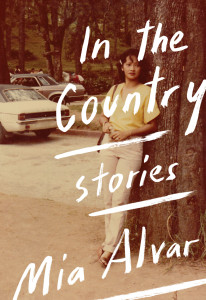 978-0-385-35281-9 – Alfred A. Knopf – Hardcover – $26.95 – 356 pages. Ebook versions available at lower prices.
978-0-385-35281-9 – Alfred A. Knopf – Hardcover – $26.95 – 356 pages. Ebook versions available at lower prices.
Mia Alvar is a young writer who was born in Manila. She grew up first in Bahrein and then her parents came to America, so from her pre-teen years onward, she was raised and now lives in New York City. She went to Harvard and got an MFA at Columbia.
These bare facts don’t tell you much, but the stories collected in her first book, In the Country, most of which are well written and compelling, dig deeply into the Philippine diaspora experience. There are many different characters, different settings from Manila to Bahrein to America. Narrative voice changes depending on who Alvar wants you best to understand. There are a couple of interconnected stories, but otherwise, each piece stands alone, and as all good short stories, they are worlds unto themselves.
I liked each of the nine stories, and was struck by Alvar’s love for her characters and sympathetic to their predicaments and foibles. Each of the stories is fine, but I do have a favorite and will wonder if listeners who take the time to read this book will agree that the strongest story here is The Virgin of Monte Ramon.
It seems that every writer who publishes a collection of short stories, no matter how brilliant and powerful the stories may be, will be expected to be working on a novel. I can’t understand why being a great short story writer is not more respected in literary culture. So I feel the need to encourage writers to be comfortable continuing to work in short form if that is what they want to do. Nonetheless, Mia is indeed working on a novel and I expect it will be as good as her stories are. I just hope she will not leave behind the short form in which she excels.
Mia is smart and self possessed, and has alot of good things to say about writing and other things; our talk together was rewarding for me and I hope as well for you.
I think this author is going to be an important writer, so recommend you find this book and buy it.
I have to mention that this is a beautifully produced book, props to Knopf for continuing to make books you want to hold in your hands and read. And I also must mention that the book’s cover, which completely captures the ethos of the book, it is terrific work that both captures and equals the writing inside the book.
Author website here.
Podcast: Play in new window | Download
Robin Gaby Fisher: The Woman Who Wasn’t There
July 25, 2012 by David
Filed under Non-Fiction, WritersCast
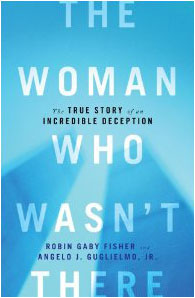 978-1451652086 – Touchstone – Hardcover – $26 (ebook edition available at lower prices)
978-1451652086 – Touchstone – Hardcover – $26 (ebook edition available at lower prices)
You really need to know the subtitle of this book to get the full impact – The Woman Who Wasn’t There: The True Story of an Incredible Deception. It is an incredible story, about a woman who became one of the leaders of the 9/11 survivors movement, who then turned out to be a complete fraud. How she managed to convince so many people of a story that was so much a part of our public experience (and so much a part of the terrible private experiences of other survivors and family members) is what makes this book compelling.
Journalist Robin Gaby Fisher wrote this book with Angelo J. Guglielmo, Jr., a documentary film-maker who was very close to the main character of the book and who was part of the story itself.
Tania Head told a dramatic and heart stopping story of survival from an upper floor of the World Trade Center, and quickly rose to a position as leader at an early stage in the development of the World Trade Center Survivors’ Network. She became a prominent public figure helping to establish the group, gave a public face to the survivors’ group, and was deeply emotionally involved in the lives of hundreds of people. Until her story unraveled and the truth became known.
It is a tricky thing for a writer to maintain the reader’s interest when the end of her story is already known – Fisher handles this problem successfully by painting an engrossing and detailed picture of Tania Head and all the people around her, and by keeping us waiting for the important details of how her story actually came apart. And while it is impossible for anyone to truly know and understand Tania, who will not speak publicly about anything at all, Fisher paints a deft portrait of a complex psychological being, who joins a long list of famous public frauds who have taken on personae that did not factually belong to them but whose beings were poured into their fantasies in service of deeply felt emotional needs.
It’s also hard not to wonder about the human need for heroes and leaders, which these sorts of confidence men and women prey on. This could happen to any of us, and perhaps especially when we are ourselves emotionally vulnerable and desperate for someone to show us the better side of the human spirit. In many ways, this story illuminates more about the nature of human suffering and stress than it could ever help us to understand the perpetrator of the fraud itself. It’s a very rewarding book to read and my discussion with Robin Gaby Fisher about the book will illuminate some of the important issues raised in her book.
Robin Gaby Fisher is a two-time finalist for the Pulitzer Prize in Feature Writing and a member of a Pulitzer Prize-winning team at the Newark Star-Ledger. She teaches Journalism at Rutgers University in Newark, New Jersey.
Podcast: Play in new window | Download
Alex Gilvarry: From the Memoirs of a Non-Enemy Combatant
March 27, 2012 by David
Filed under Fiction, WritersCast
 978-0670023196 – Viking – Hardcover – $26.95 (ebook and audio book versions available)
978-0670023196 – Viking – Hardcover – $26.95 (ebook and audio book versions available)
Brilliantly composed as a satire on a broad swatch of contemporary American life, Alex Gilvarry’s From the Memoirs of a Non-Enemy Combatant will sneak up on you and whack you straight across the face. Even if you see it coming. I loved the writing, which is smart and slick, beautifully evocative, from a writer clearly in love with language and its many powers. For a first novelist, Gilvarry displays considerable writing chops, on top of his comedic skills and ability to skewer so many elements of the popular culture we have so taken for granted.
This book is structured as the unreliable narration of its main character, Boyet (Boy) Hernandez, who is a Filipino fashion designer come to New York to make his way in the world. The first two thirds of the book is his almost hapless story of the road to success (many wild and crazy people and events along the way), where we come to know and care about, but not necessarily love Boy, who is sometimes so self-involved and full of shit, even as he is talented and appealingly immature (I want to say “jejune” but he’s not quite that bad).
But things turn dark, when Boy is arrested and sent to Guantanamo and both privately and publicly humiliated as a suspected terrorist. This is where the author can turn his powerful satiric eye onto the political and cultural state of America at perhaps its worst. There is nothing more frightening than to see a true innocent (naif is the right word here) caught in the web of the modern anti-terror police state. While Boy is eventually freed, and as readers we are relieved, his life can never be the same – his glorious desire-fueled run into the heart of American pop culture has been destroyed, and he must become a new and immensely different person, and this is not necessarily for the better, in his case.
Ultimately, for this author, it feels as if there are two Americas, co-existing, but on different planes of existence. Both are heightened realities, in which most of us seem to live without really understanding what they mean. In many ways, this novel, with its humor, pathos, narrative power, and its ability to pinpoint cultural weaknesses and failures, can do more to help us understand the necessities of political and culture action than any of even the best nonfiction treatises that address the manifold issues of the early 21st century.
But don’t worry about the politics, just read this book for the wonderful novel it is, and draw your own conclusions about what you want to do after you read it. You might just want to listen to this interview then to hear more from Mr. Gilvarry about his book and how work as a writer (and editor – Alex is now the editor of the book review collaborative Tottenville Review, which I recommend you visit).  I had a wonderful time talking to this author and hope you will also enjoy the conversation.
I had a wonderful time talking to this author and hope you will also enjoy the conversation.
Also, visit Alex Gilvarry’s website for more information and news about this book and his work.
Podcast: Play in new window | Download
Amor Towles: Rules of Civility
November 4, 2011 by David
Filed under Fiction, WritersCast
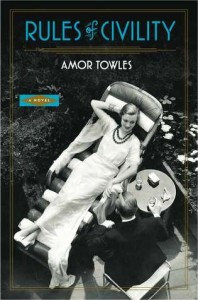 978-0670022694 – Viking – Hardcover – $26.95 (ebook and audiobook versions also available)
978-0670022694 – Viking – Hardcover – $26.95 (ebook and audiobook versions also available)
Amor Towles’ Rules of Civility has become my favorite books. This WritersCast interview series has allowed me to read some incredibly good books this year; Amor Towles’ story of New York City in 1938 has risen to the top of my list of novels I fell in love with.
Rules of Civility opens with the book’s heroine, older, successful, married, with her husband viewing the famous mid-sixties Museum of Modern Art showing of Walker Evans’ 1938 New York City subway photographs. She and her husband see and talk about two particular photographs – a man she knew in 1938 and who mattered hugely to her life and helped shape the arc of her entire life. Then the real story begins, as flashback to that high intensity period of her life, when by accident, she began the process of becoming the person we meet at the opening of the book.
It’s a great way to start a book. Reminding us of just how much a role chance and happenstance – and what we make of it – means to our lives. Author Towles loves the way opportunity winds around us, especially it seems at the fraught time in our lives when we are setting out in the world to define ourselves, when we make the choices that define our lives, sometimes purely accidental, sometimes with just an inkling that these choices will have monumental effects.
There is a wonderful story here. Our heroine, Katey (who grew up as Katya, an immigrant’s daughter), is living in Manhattan. It’s 1938, still Depression era America, but just on the cusp of its ending. New York is both gritty and glitzy at the same time. Katey is working as a legal assistant, going out at night with her limited funds and her few friends.
One night, she and her best friend meet a man who will thrust Katey into a new life, where she meets the smart set of society, and gains the confidence to become a modern, successful woman, in many ways mirroring the American story arc of the same period.
Towles is a terrific writer, and I found myself reading some passages aloud to revel in the beauty of his sentences. He brings New York in 1938 to life, reminding us how close we actually are to what is now almost a forgotten period of our history. The book made me want to see again some of the great movies of this era, all of which shared the ironic understanding of modern culture this book displays. I’m quite certain Towles has seen them all and internalized their values.
You need to read this story for yourself – it’s complicated and has an utterly rewarding denouement. Suffice to say, Katey learns a great deal about the people she meets, loves some, despises others, and absorbs what she learns on the way to becoming herself. This one year is the pivot point for her entire life, and the sense we get from the story is that New York has engendered the same for millions who came there for a very long time, though probably for many less self-aware than Katey and her author, Amor Towles. Here’s one of the great lines from the book that in some ways encapsulates the story it tells: “from this vantage point Manhattan was simply so improbable, so wonderful, so obviously full of promise — that you wanted to approach it for the rest of your life without ever quite arriving.” Perfect.
This is Amor Towles’ first published novel. In our discussion, we talked about how he was able to write it, despite having a full time job and a family. And we talked about the story of the novel, and its characters, and about New York in the 1930s, a great and somewhat neglected period for fiction. It’s a great book and I hope an equally rewarding conversation for listeners.
Amor Towles website is worth a visit. And you also might enjoy George Washington’s Rules of Civility (& Decent Behaviour In Company and Conversation) which plays a critical role in this novel. And a nonfiction piece he wrote called What I learned from Cole Porter on Oprah.com.
And a nonfiction piece he wrote called What I learned from Cole Porter on Oprah.com.
Podcast: Play in new window | Download
Paul David Pope: The Deeds of My Fathers
December 12, 2010 by David
Filed under Non-Fiction, WritersCast
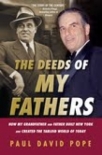 978-1442204867 – Hardcover – $24.95 – Philip Turner/Rowman & Littlefield (e-book editions available at $9.99)
978-1442204867 – Hardcover – $24.95 – Philip Turner/Rowman & Littlefield (e-book editions available at $9.99)
Well this is truly an amazing 20th century American story, and really well told by the author, who spent many years working on this book. There are characters here as big as those in any historical novel. The full title of the book gets to what the story is about: The Deeds of My Fathers: How My Grandfather and Father Built New York and Created the Tabloid World of Today.
Paul David Pope’s grandfather, Generoso Pope Sr., came to this country alone and poor, at a very young age seeking a better life, as so many other immigrants did. That part of the story is hardly unique. But he was obviously a very special sort of person, and it did not take him very long, through hard work, intelligence and a certain amount of ruthlessness, to create a building trades empire in the greatest city in America, New York City.
His companies supplied the concrete that literally built the city in the boom years of New York. But he also managed to buy and control this country’s primary Italian language newspaper, Il Progresso, and his wealth, power and connections (including political kingmakers, the mob, and even FDR as well as the Pope) made him one of this country’s leading and most influential Italian Americans. Because he was able to use his newspaper to influence elections, he essentially became a kingmaker in the old school of American politics, and was truly an iconic emblem of his times.
But author Pope does not shy away from telling us the ugly along with the good. His grandfather was far too close to Mussolini in the 1930s, and was blatantly used by the Fascists to try to influence American public opinion in their favor during the lead up to World War II. And he was far from being a good husband and father. He always favored his youngest son, Gene (author Pope’s father), and selected him to run his businesses, over his older and more experienced brothers.
Early on, Gene Americanized his name to Pope. He was pushed out of the family business after his father’s death by his mother and his two older brothers. At that point, Gene, with a loan secured from his “Uncle Frank” Costello, bought a newspaper in decline, the New York Enquirer. With a combination of dedication and a brilliant natural understanding of what average readers would want to read, he created the pinnacle of all tabloids, the National Enquirer. Of course, the support of his Uncle Frank did not come without strings, and Frank required that the paper stop attacking the mob in its stories, and in fact it was to publish only positive stories about projects the mob was backing, and even that the Enquirer would attack and discredit the enemies and opponents of organized crime – which it did without hesitation.
But the heart of Gene Pope’s story is his single minded dedication to the newspaper he loved. He moved the company to Florida and made it almost the only thing he cared about. As he grew older, he was clearly eccentric in his behavior (some might say nighly neurotic and disturbed). But throughout, Gene Pope gives readers what they want, and as the National Enquirer covers the paranormal, medical cures, celebrities, always attentive to what the average American would read, and circulation soars, peaking with the 7 million copies sold of the Enquirer’s 1977 exposé on the death of Elvis Presley.
Paul David Pope gives us a fast paced, almost novelistic version of his family’s history. His story is based on hundreds of interviews, and a huge amount of research, but of course much of what happened in the earlier part of the story is reconstructed from the documentary record. It is a gripping narrative, and a compelling story for anyone who cares about the modern history of the United States as lived by some of its more colorful and successful citizens, and the author gets across the complexity of his real life family in their non-stop rush to make their marks.
Talking to the author gave me a chance to delve into the background of the story, what motivated Paul to do all this work and stay with it for so long, and for him to talk about how his family history has affected his own life. There’s more about the book at the author’s website too.
Podcast: Play in new window | Download
Kevin Baker: Luna Park (Graphic Novel)
December 5, 2010 by David
Filed under Fiction, Graphic Novels, WritersCast
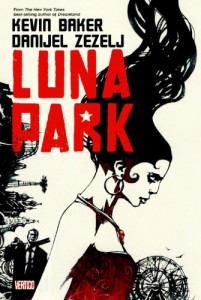 978-1401224264 – paperback – Vertigo – $14.99
978-1401224264 – paperback – Vertigo – $14.99
Luna Park is an outstanding first graphic novel by historian and novelist Kevin Baker. Baker is certainly well-known for his best selling New York City based trilogy of historical novels (Paradise Alley, Dreamland and Strivers Row). And recently he was the consultant for the History Channel’s extremely fine mini-series, America: The Story of Us, as well as being the author of its companion book.
Luna Park is centered on a former Russian soldier, Alik, who fought in Chechniya now living in Coney Island, working as the enforcer for a small time Russian mobster. He is addicted to heroin, and haunted by his memories of the horrors of the war and his own part in it. He desperately loves the prostitute Marina, whose daughter is held captive by the mob boss as a way to keep her under his control.
Alik comes up with a desperate plan he has convinced himself will save Marina, her daughter and himself. It’s at this point that the story takes a turn, as Alik discovers he is destined to repeat his past lives repeatedly, including a few pasts the present Alik does not know he had. There are flashes from present- day run down Coney Island to the Russia of 10 years ago during the Second Chechen War to an earlier time period in Coney Island, when the area was at its peak as an amusement park that really was amazing to behold.
Baker keeps us traveling with him throughout, even though the story is complex, the pain palpable and the suffering of the characters in their struggles seems to never let up. The work of the artist Danilej Zezelj is perfectly suited for this story. His art is dark, powerful and energetic, and adds tremendously to the strength of the story. DC Comics deserves praise putting Baker and Zezelj together, it’s a terrific collaboration.
Kevin Baker and I talked at length about this, his first graphic novel, both in the context of his work as a fiction writer and historian, and of course his deep interest in the City of New York, especially its seamier areas like Coney Island, as well as how writing a graphic novel in collaboration with an artist is different from other types of writing. we were able to range widely about a number of other subjects, making this conversation one I hope listeners will particularly enjoy.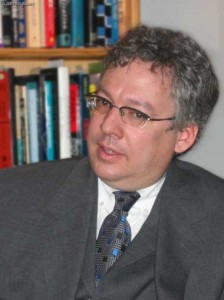
Podcast: Play in new window | Download

